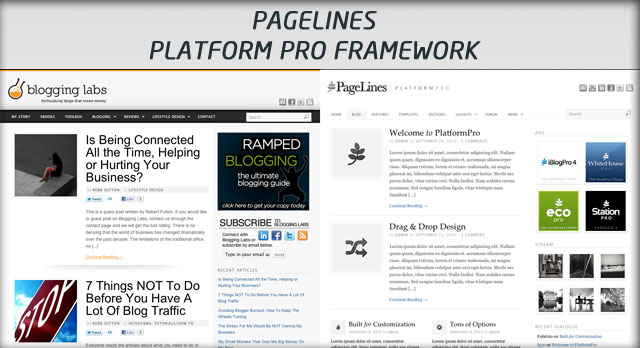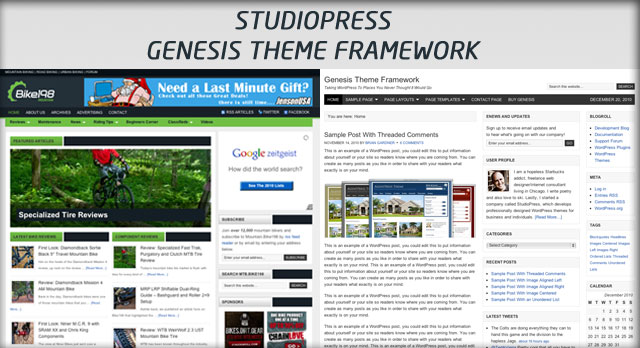Over the past couple of years, Wordpress theme frameworks have been growing in popularity. With features like SEO integration and clean coding, frameworks like Thesis, Headway, Genesis and Platform Pro are continuing to take their bite out of the premium Wordpress theme market. As you look at your blog and try to decide what look is going to go over well with your readers, it is natural to look towards these options due to their popularity in the market and marketing push, but are they the right option for your blog?
Over the past couple of weeks, I have redesigned my two biggest blogs incorporating frameworks. This blog, Blogging Labs, got the Pagelines Platform Pro treatment and Bike198 made the switch to Studiopress’s Genesis framework. Before we jump straight into if you should be looking to frameworks for your blog, let’s take a quick look at the before and after on each of my blogs.


You can see the layouts and themes live by clicking here: Bike198.com | Blogginglabs.com | StudioPress Genesis | Pagelines Platform Pro
The Positives: Theme Frameworks
Wordpress theme frameworks provide a lot of positive features for the blogger and these features are what make frameworks popular today. Let’s take a look at some of the most significant.
Easy Upgrades Over Time
In a typical setup, a Wordpress theme framework acts as the underbelly to your theme. When installed, you do not edit or make changes to the theme itself, but you instead make a “child theme” that lays over top the framework. All of your coding, design and other changes are made within this child theme separate of the framework. When it comes time to upgrade Thesis, Genesis or any other framework you chose to run, you can completely upgrade the theme without having to change the core files again to reflect your changes. This is HUGE for bloggers who have really created their own look.
Provides A Solid Foundation For Custom Themes
Before theme frameworks, when you wanted a full custom Wordpress theme, your designer had to go through the long task of converting their pages into the Wordpress format. This procedure had a large cost to it as they are trying to get a specific look to integrate with Wordpress. With theme frameworks, designers can take that look and lay it over a solid Wordpress foundation seamlessly drastically reducing the amount of time it takes to develop a custom look. This also reduces to the cost to the blogger and allows for more “custom” options to lower budgets.
On the bloggers end, it also does not keep you tied to one designer as most of the community can work directly over these frameworks, so if your designer decides to hang up his designing hat…you can still find someone else that can work on your site without having to dig through custom code. The framework’s code is also very clean, so the blogger does not have to worry about the designers coding ability as that can have an adverse affect on page load speed and SEO if done incorrectly.
Hooks Provide Placement Advantage
Do you want to add a advertisement at the bottom of every article? How about a new global nav? This used to be a hard and tedious procedure as you had to dig through pages of code and test what would work to edit your core files and add that feature. Now…with theme frameworks and their implementation of hooks, you can easily add elements to your blog without having to edit core files. Some frameworks like Headway and Platform Pro allow drag and drop functionality and other frameworks like Thesis and Genesis have plugins that make things easier on the blogger. Either way…you are guaranteed to be able to add elements quickly and easily without affecting your core files.
Negatives: Theme Frameworks
However, like most things in life…nothing is perfect so you need to take a look at these drawbacks to theme frameworks before you make the decision to use one on your blog.
Do You Know How To Design?
When you activate your theme framework for the first time, you are going to notice that your site looks incredibly bland. Have you ever seen those plain white Thesis based sites popping up all over the web? That is because they bought the theme, activated it and started writing without any real knowledge of what it takes to make a blog look unique. Your blog design is one of your most important converting elements behind content. Your blog needs to stand out amongst the competition…not look exactly like it. If you do not have the funds or ability to make your Wordpress theme framework unique, you are going to get frustrated as your blog looks exactly like everyone else that just hit activate and got to work writing.
While there are some premium child themes on the market and companies like Studiopress offer different child themes to go over their frameworks, be prepared to spend extra cash on top of the framework itself if you do not have CSS and php knowledge. Theme frameworks are not just plug and play like some other options from WooThemes, Elegant Themes and WPZoom which offer more out of the box options.
SEO Integration vs. Long Term Options
One of the marketing tricks of Wordpress theme frameworks has been SEO integration. While I agree that their clean code does greatly help with SEO over time (Google hates messy code), theme frameworks also advertise their SEO integration with titles, descriptions and other elements that were previously handled by plugins like All-In-One SEO. In my opinion, by integrating all of those elements into your theme, you are marrying yourself to that theme over time and insuring your repeat custom basis with that Wordpress framework by making it harder to switch in the future if you look to integrate a different look or framework. While it is true that less plugins equal a faster site, I still keep my SEO duties to a plugin so if I want to change my theme sometime in the future…I do not have to worry about porting that integration.
My Recommendation To Bloggers
As you are probably wondering by now…what is my recommendation to bloggers as you look to Wordpress themes as a way to make your blog unique? Both of my main blogs are now running theme frameworks for the benefits they provide my sites. However, I have enough CSS and php knowledge to create that custom look that I was after without having to spend any extra money for a custom design. If you do not have the ability or funds to create a more custom look than the standard white on black that theme frameworks provide, I would start looking at places like WooThemes, Elegant Themes, WPZoom and Theme Forest to find a layout and look that fits your blog. There are enough great looking premium themes out there that you should not have to worry about looking exactly like your competition.
If you can afford to pony up for the custom look or premium child theme, Wordpress theme frameworks are a great way to get clean code and a custom look without paying the high cost of a full blown custom Wordpress option. The cost difference is in the thousands and there are plenty of quality designers that will work straight over any of the theme framework options. That also provides you with a solid platform to create edits as you see fit without having to contact your designer with every change.
As with most things in life, there is not one solution for everyone. You need to look into your needs and abilities to see what is the right choice for you. Just because everyone else is doing it…that does not mean it is the right option for your blog. If you plan on throwing up a stock install of a Worpress theme framework and making a lasting impression on your readers…you are going to be disappointed in the end.
Theme References Mentioned In Article:
Wordpress Theme Frameworks
Premium Wordpress Themes


13 comments
Rob
There is a spelling mistake in your Blogginglabs link…
Andrew
http://usingwindowshomeserver.com
Thanks for the heads up. Sometimes an i and l look the same on the screen. Got it fixed!
Cool stuff mate. Yea I agree totally that Thesis and others require more knowledge and time to get it just right. So be prepared to handle that or outsource the work.
Another good premium wordpress theme site is at http://mojo-themes.com
On a side note it’s been cold as a polar bears crack down here but gonna be in the fifties today so I plan on partying in the woods on my 29er!!
Have a great week bro!
Brandon
I keep my website very simple, because I learned a long time ago it best to keep it simple so people can understand..so far it has work. But you still don’t want something so simple that people don’t come back..use an theme that will wow your readers.
“Black Seo Guy “Signing Off”
Have you checked out http://standardtheme.com ? named one of the top themes out there by mashable: http://mashable.com/2010/09/24/best-premium-wordpress-themes/
Robb,
Good post. You outline the advantages and disadvantages to using a theme that is a framework vs. one that comes with a design like Woo Themes. I will use your post to educate friends about Wordpress and premium themes.
I started using Chris Pearson’s Thesis when it first came out for several sites. I found it rich in features. Several months ago when I merged two Thesis sites in one my new site crashed. After more than a month of working with Chris and his support they still couldn’t fix it. We eliminated all other possible problems – it was Thesis. Because of their inability to fix it I am switching to Genesis.
that stinks!
Nice write up.. I agree with Antonio.. I stick with a theme design, got it tweaked and Im happy. For new bloggers I would def recommend looking for just a theme they like and go from there.
Robb, this is a great breakdown. I agree with your assessment of the advantages and disadvantages of theme frameworks. It used to be that if you wanted to do it yourself you were forced to learn how to code and design stuff and go way outside of your comfort zone. If you weren’t willing to do that, then you had to hire somebody, which is a whole different minefield.
Theme frameworks are the best middle-of-the-road solution to date. You can design your site without code for the most part. Some themes, like Headway, let you do amazing things without knowing any code. But there is a price for everything, and the cost of a premium theme framework (beyond it’s initial monetary cost) is its learning curve.
These frameworks operate like software programs in their own right. As such they have a bit of learning curve. It’s not nearly as grueling as trying to debug the crappy CSS code you wrote because you’re still trying to figure out how padding and margin work in the CSS box model. But there is a learning curve, so look for a theme framework that has the best, friendliest documentation and support options.
What’s your assessment of Platform compared to Genesis? I’m currently using the free version of Pagelines’ Platform and am debating between upgrading to the pro or purchasing a Genesis child theme. Thoughts?
Jeff…Honestly…I am kind of torn at this point. I really like the drag and drop aspect of Pagelines, but I like designing around Genesis better. I have been considering redesigning Blogging Labs on Genesis.
Interesting. Would you recommend it for a non-code guy?
Woothemes, WPZoom, Elegant Themes, Theme Forest